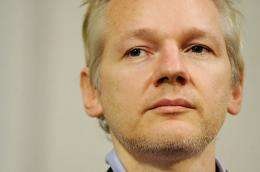NY Times details rocky relationship with WikiLeaks

WikiLeaks founder Julian Assange resembles a character from a detective novel and is "elusive, manipulative and volatile," the executive editor of The New York Times says in an upcoming book.
"Open Secrets: WikiLeaks, War and American Diplomacy," a digital book featuring an introduction by Times executive editor Bill Keller and contributions from other Times reporters goes on sale Monday.
The Times described the e-book, which will cost $5.99 and be sold through online bookstores from Amazon, Apple and others, as the "definitive chronicle of the WikiLeaks documents' release and the controversy that ensued."
In his introduction, excerpts of which were posted online by the Times, Keller traces the start of the tumultuous relationship between the newspaper and Assange, the Australian-born founder of WikiLeaks.
Keller said it was Alan Rusbridger, editor of Britain's The Guardian, who convinced Assange in June last year to involve the Times in publication of the secret US military documents on Afghanistan and Iraq obtained by WikiLeaks.
"The adventure that ensued over the next six months combined the cloak-and-dagger intrigue of handling a vast secret archive with the more mundane feat of sorting, searching and understanding a mountain of data.
"As if that were not complicated enough, the project also entailed a source who was elusive, manipulative and volatile," he said, and "government officials who sometimes seemed as if they couldn't decide whether they wanted to engage us or arrest us."
Keller said Assange never revealed the source of the secret US documents, although the Times editor said he suspected they came from a disillusioned US Army private, Bradley Manning, who is now under arrest.
He said the Times considered Assange a "source" -- one who "acted like a fugitive, changing crash pads, email addresses and cellphones frequently" -- and the newspaper "was never asked to sign anything or to pay anything."
"We regarded Assange throughout as a source, not as a partner or collaborator, but he was a man who clearly had his own agenda," he said.
Keller said the reporters who worked with Assange on the documents came to think of him as "smart and well-educated, extremely adept technologically but arrogant, thin-skinned, conspiratorial and oddly credulous."
"Assange was openly contemptuous of the American government and certain that he was a hunted man," Keller said.
He said the Times "felt an enormous moral and ethical obligation to use the (WikiLeaks) material responsibly," and he took WikiLeaks to task for not doing so with the release of the first documents from Afghanistan.
"From the beginning, we agreed that in our articles and in any documents we published from the secret archive, we would excise material that could put lives at risk," he said.
The Times redacted many names and "edited out any details that might reveal ongoing intelligence-gathering operations, military tactics or locations of material that could be used to fashion terrorist weapons," he said.
"WikiLeaks's first data dump, the publication of the Afghanistan War Logs, included the names of scores of Afghans that the Times and other news organizations had carefully purged from our own coverage," he said. "I anticipate, with dread, the day we learn that someone identified in those documents has been killed."
Over time, the relationship with Assange went "from wary to hostile," Keller said, adding that the WikiLeaks founder particularly disliked a Times profile of Manning and one about himself.
"I came to think of Julian Assange as a character from a Stieg Larsson thriller -- a man who could figure either as hero or villain in one of the megaselling Swedish novels that mix hacker counterculture, high-level conspiracy and sex as both recreation and violation," Keller said.
Keller said Assange decided to cut the Times out of the release of the stash of US diplomatic cables but the Guardian turned them over anyway.
Ahead of the release, the Times held a meeting at the State Department with "unsmiling" officials from the White House, State Department, Office of the Director of National Intelligence, CIA, Defense Intelligence Agency, FBI and Pentagon, he said.
Daily conference calls were subsequently arranged, he said, and the Times "relayed the government's concerns, and our own decisions regarding them, to the other news outlets."
Keller also said he would oppose any attempt to prosecute Assange on First Amendment grounds.
"While I do not regard Assange as a partner, and I would hesitate to describe what WikiLeaks does as journalism, it is chilling to contemplate the possible government prosecution of WikiLeaks for making secrets public," he said.
Within hours of going online, Keller's article drew condemnation from WikiLeaks.
"NYTimes does another self-serving smear. Facts wrong, top to bottom. Dark day for US journalism," WikiLeaks said in a Twitter message.
(c) 2011 AFP



















